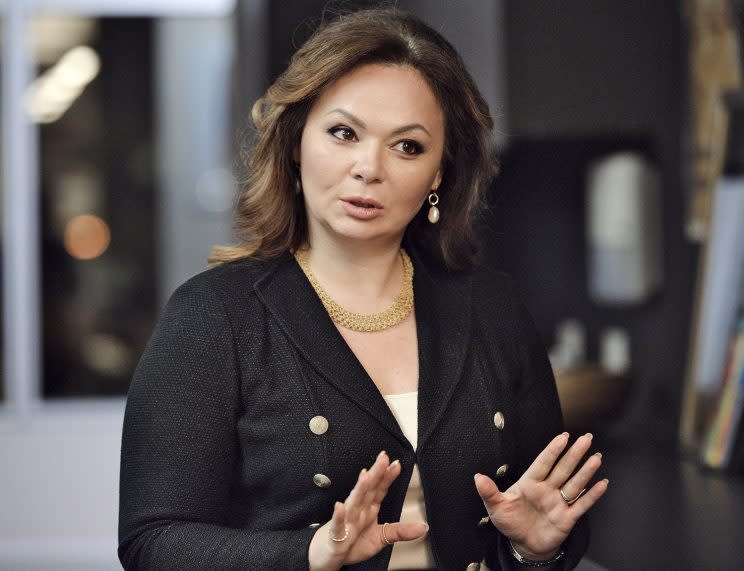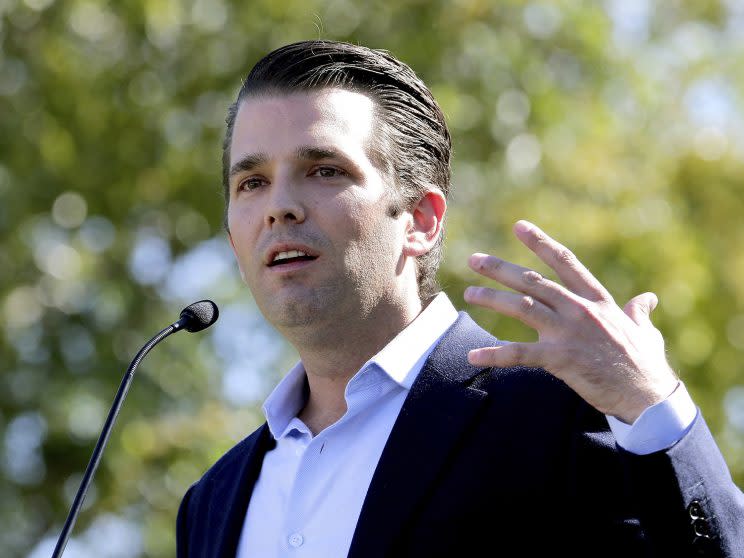Who is Natalia Veselnitskaya, the Russian lawyer who met with Donald Trump Jr.?

Russian lawyer Natalia Veselnitskaya reportedly lured Donald Trump Jr. and other members of his father’s presidential campaign team to a meeting at Trump Tower last June with the promise of providing compromising information on Hillary Clinton.
Veselnitskaya has denied any affiliation with the Russian government. A spokesman for Russian President Vladimir Putin told reporters Monday that the lawyer’s name wasn’t even known in the Kremlin. So who is this latest player now at the center of the ever-changing accounts of ties between the Trump campaign and Russia?
According to an affidavit she submitted to U.S. District court in Manhattan last year on an unrelated matter, Veselnitskaya has been practicing law in Russia since she graduated from the Moscow State Legal Academy with a degree in jurisprudence in 1998.
For three years following graduation, Veselnitskaya said, she worked in the Moscow Prosecutor’s Office, “overseeing the legality of statutes that were adopted by legislators of Moscow Oblast,” before forming her own private law offices in 2003.
“Among my clients are large state-owned private corporations, as well as clients from the real estate and banking sectors,” read the affidavit. “I represent victims in many criminal cases involving economic crimes.”
Included on her roster of more high-profile clients is Denis Katsyv, the son of state-owned Russian Railways vice president Petr Katsyv, and himself the owner of a Cyprus-based investment firm called Prevezon Holdings.
At the time of her fateful meeting at Trump Tower with Donald Trump Jr.; Trump’s son-in-law, Jared Kushner; and Trump campaign manager Paul Manafort, Veselnitskaya was a member of Katsyv’s legal team defending Prevezon against charges of money laundering brought by then-Manhattan U.S. Attorney Preet Bharara. The complaint alleged a scheme by Russian politicians and New York real estate figures to conceal as much as $230 million.
Bharara was fired by President Trump in March. In May, days before the Prevezon trial was set to begin, the U.S. agreed to settle the case with the company in exchange for a civil forfeiture of $5.9 million.
“This settlement is nothing short of a victory for Prevezon,” Faith Gay, an attorney for the company, told Bloomberg at the time. “It’s almost an apology by the government.”

While defending Katsyv, Veselnitskaya had a run-in with immigration officials. In the affidavit mentioned above, Veselnitskaya said she had been denied a visa to enter the U.S. for her work on the Prevezon case but ultimately received a parole letter temporarily permitting her to enter the country.
Veselnitskaya claimed she was “harassed” by the U.S. government, detained for two hours and strip-searched by security officers at London’s Heathrow Airport while traveling back to the U.S. following a brief trip to the U.K. in November 2015.
“I should not be subjected to such humiliation when I have been promised entry into the United States to defend against the scandalous accusations in this lawsuit on behalf of my clients,” she stated in the January 2016 affidavit, which she said had been translated for her as she does not read or write in English. She argued that she should be able to remain in the country for the duration of the Prevezon case.
According to the New York Times story, however, the FBI had been keeping an eye on Veselnitskaya, who has been a leader in Russia’s efforts to overturn the Magnitsky Act, a 2012 law that created a blacklist of Russian officials suspected of human rights abuses, who are not permitted to enter the United States or use its banks.
Veselnitskaya was reportedly instrumental in creating the Human Rights Accountability Global Initiative Foundation (HRAGIF), a Delaware-based lobbying organization led by Rinat Akhmetshin, a former Soviet officer-turned-D.C. lobbyist who has been accused of working for Russia’s military intelligence agency, GRU.
In addition to repealing the Magnitsky Act — named for Russian whistleblower Sergei Magnitsky, who died mysteriously in prison after exposing the massive tax fraud and corruption scheme that was at the center of the U.S. case against Prevezon — HRAGIF’s objectives include presenting a more favorable (to the Kremlin) account of Magnitsky’s death and opposing passage of additional measures in the U.S. Congress aimed at Russian corruption.
Veselnitskaya was allegedly involved in orchestrating U.S. screenings of an anti-Magnitsky film in June 2016, the same month she reportedly sought a meeting with then-presidential candidate Donald Trump’s oldest son.
Though Putin has been a vocal opponent of the Magnitsky Act since it was first considered in Congress, the Kremlin has denied any connection to Veselnitskaya, insisting that it was not even aware of her name.
Veselnitskaya did not respond to multiple requests for comment from Yahoo News, but she told the New York Times in a statement that she had “never acted on behalf of the Russian government.” She also denied discussing anything related to the presidential campaign during her meeting at Trump Tower — contradicting Trump Jr.’s own account of the meeting.
Read more from Yahoo News:
‘Had to listen’: Trump Jr. confirms meeting Russian lawyer to discuss Clinton
ISIS, driven out of Mosul, leaves behind a city in ruins and a society shattered by distrust
‘That is so illegal!’ Trump lashes out at Comey after report that memos may have been classified
Conway clashes with CNN’s Cuomo over Trump Jr.‘s Russian lawyer meeting


